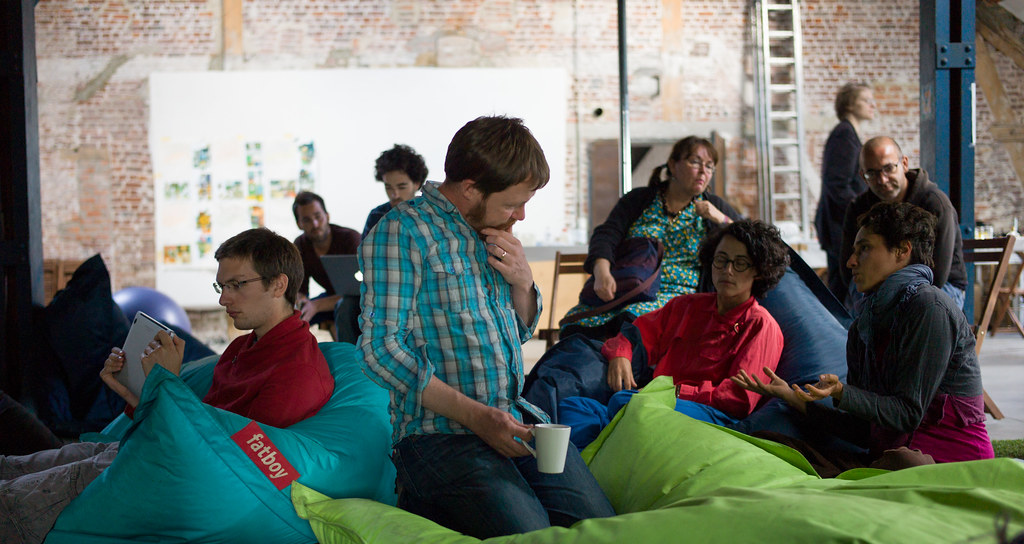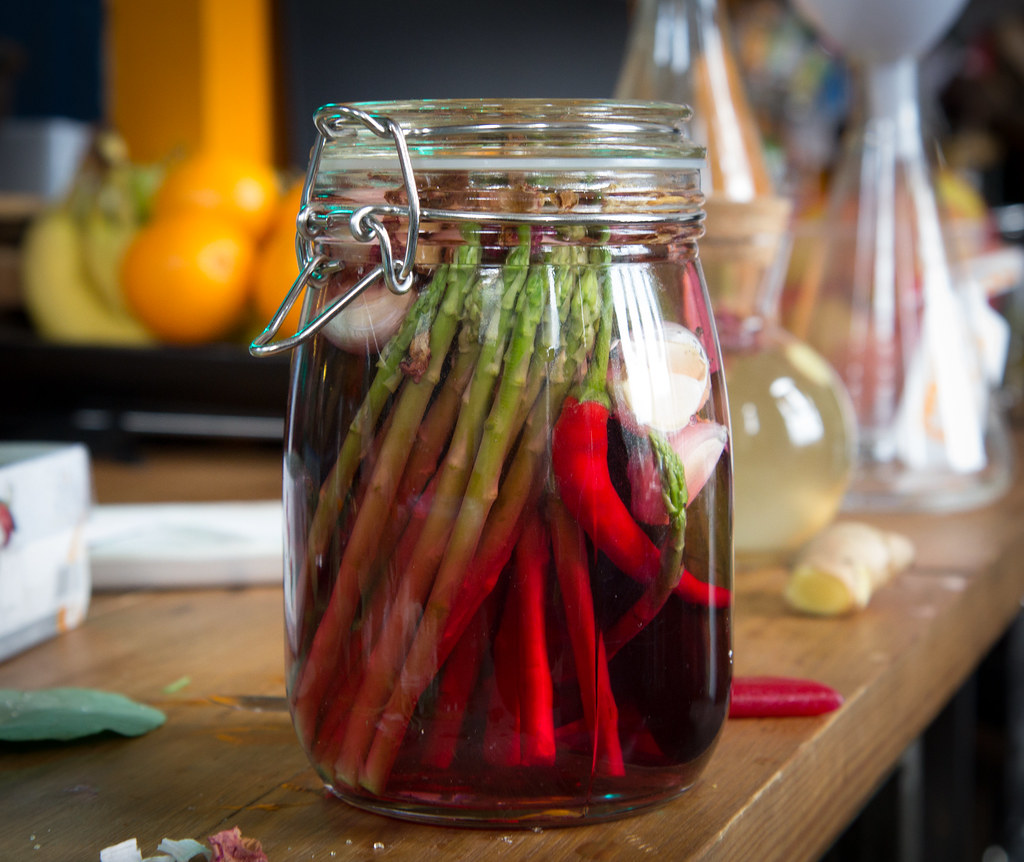Table of Contents
Biochymickal Arts 20130915
day three of Biochymickal Arts 2013
Improvisation and speculation
Both improvisation and speculation seemed to be the order of the day, especially when we began to move into realms of bio-based plastics and electronics, synthetic biology and bio-punk. I hope that continued improvisation will bring fermentation and biohacking, hands-on crafts and the art of asking meaningful questions.
Closing the loops with bio-materials
Michka and Brian talked about replacing toxic, polluting and rare materials with organic and compostable ones. Metal with melaning, petroleum with starch and casein, plants composted long ago (turning into oil), with plants composted on our terraces. When talking about closing the loop, seeing waste as a resource is an important aspect. Byproducts of fermentation and other processes can become valuable components somewhere else. Ethanol for energy production, glicerol for plastics, cardboard packaging and coffee grounds for propagating mushrooms.

Rethinking intelligent systems
We talked about the need to rethink how we create and use intelligent systems. Two approaches were mentioned: one inspired by permaculture and biomimicry, where we learn about how the parts make and adapt to the whole, through observation, then interaction; and another approach, that of synthetic biology, where we can engineer parts to change the whole system, for example engineering genes in bacteria in order for them to change their behaviour or function, thereby helping us perform better (by producing superglue, indicator colours or vitamin C for example. Talking aboout genetically modified bacteria necessarily brought us to the difficult questions of how do we make sure they stay in the labs, especially when labs begin being hosted in “my mom's basement”?
People and politics
The GM discussion was only one element of our discussion about the politics of DIY biology. We discussed the changes in licensing home-labs, the FBI becoming interested in DIY biolabs, the GMO phobia (for better or worse), including “Glowing Plants (natural light with no electricity)” project being kicked off Kickstarter, because they used GMOs. On the fermentation end of the spectrum, we discussed social history of sour dough and political and economic challenges surrounding Lithuanian beer yeasts.
Meredith talked about Biopunk, as presented in LA in 2010, and what has changed since. Biopunk manifesto was a call for increasing scientific literacy in the field of biology and biotechnology, independent and open research for the betterment of communities (and many other things). There have been successes (PLOS, Open PCR, Eterna game, liquid handling robots, inserting plasmids into bacteria using the piezo barbecue lighter, colony printers…), but they are few and far between. The biggest issue seems to be that of replicability and the need for collaborative platforms (akin to an online lab notebook, a seed-sharing place, or a github for DIY biologists). Talking about people and politics, we very quickly stumbled on the language and metaphor issues again, especially with computing metaphors applied to biological systems.

bio based electronics
Mischka Melo
- experiments in finding ways to improve environmental footprint of electronics
- currently ~45 metals used in microcircuitry
- currently ~80% of waste → landfill. (ref. ~75% metals in landfill is from electronics)
- can we build compostable electronics?
- primary work transistor made using milk,carrot,fish,ecoflex,brocilli, sugar
- ref. Mihai Irimia-Vladu - many papers online at http://www.jku.at/ipc/content/e166682/index_html?team_view=section&emp=e166682/employee_groups_wiss166736/employees175992 and http://www.researchgate.net/profile/Mihai_Irimia-Vladu/publications/
- La Paillasse as venue for DIY experiments with melanin as living semiconductor
- can melanin be produced in a kitchen-lab?
- created cultures using food grade materials available from supermarket
- target component is a thermistor
- using permaculture principles to enhance 'intelligence' of agricultural systems
- space and time trade off, new techniques required to use biological substrates for computation
- ref. biological computation research group mentioned in Biomimicry by Janine M. Benyus
- biomimetic kettle w. guillian graves, based on nautillus shell, spherical compartments per cup, clay using bioethanol [ref.] (note. biobutnol)
domestic plastics
Brian Degger
ref. http://medialab-prado.es/article/interactivos10_muestra_de_proyectos
- plastics that can be made at home, can be used in the home
- what kind of domestic uses are there for plastics than can be made in the kitchen?
- based on glycerol, starch and vinegar
- cooking up toys based on templates
- why is it a plastic? a polymerised chain
- compostable?
synthetic biology
hugo herter
- what materials do you need to program cells?
- introduction to biology, classification, molecular biology
- about ~1.5% human genome coding for proteins
- DNA, RNA, Amino Acid, Proteins, (UGC, codons)
- transcription video https://www.youtube.com/watch?v=D3fOXt4MrOM
- synthetic biology - engineering, molecular biology, modelling
- regulation of expression
- BioBricks (e.g Promoter, RBS, Gene, Stop) → http://partsregistry.org
- iGEM 2009 entry → E.Coli biosynthesis of superglue
- principles; chemotaxis, quorum sensing, non-proliferation
- in your garage
- order DNA (online, CC), Insert DNA (competent bacteria, transformation device), Grow bacteria (selection, application)
biopunk
- meredith (see maja's notes)
misc
Lithuanian farmhouse brewing
discussion of recent developments in the Lithuanian beer craft/culture which grew form M.s interest in home-brewing.
post 1991 previously 'underground' semi-legal breweries became legal. ~200 then, ~60 now. commercial brewing was thus based on home-brewing style techniques and included some peculiarities (e.g. not boiling the wort, unpasteurised → target for wild bacteria, baking loaves of malt and using crumbs in brewing, ritual of sauna before brewing, starting the process in sauna) some family yeast cultures have a verifiable history around 160 yrs.
in “Lithuanian farmhouse brewing” article, beer connoisseur magazine covered 20 breweries in 4 days (hosted by T.A) surprised by distinct tastes and techniques. sequencing of the yeast DNA led to conclusion that there may be a distinct species or hybrid in the J. strain.
Sourdough rye bread
riitta oittinen
- The Finnish love affair with ruisleipä (sourdough rye bread):http://kasviksenabelgiassa.wordpress.com/2013/09/30/the-finnish-love-affair-with-ruisleipa-sourdough-rye-bread/
summaries
(see maja's notes)
- closing loops with bio-materials
- rethink intelligent systems
- people & politics
- need time to ferment
- in three words
- “they are hungry”
- “time,impressive,new”
- “inspiring social fermentation”
- “go for it”
- “sharing”
- “interspecies fecundation”
- “too much food” → “much food too”
- “anticipating practical experiments”
- “enzymatic historical hacking”
- “time aware processes”
- “fermentation releasing energy”
- “creative, bulling reactions”
- “micro world tourism”
- “dexterity is hard”
- “slow process, fast experiments”
- “sleep. bubbling. people”
- “more research required”
More time to ferment
At the end of the workshop, we can look back and attempt to answer FoAM's question “What happens when we put together biohackers and fermenters”? Here are a few answers:
- many questions are raised and a few are answered
- surprising things are learned by all, and many “aha” moments have been counted
- there are plenty of stories to tell, share and listen to (that need recording!)
- there is no shortage of ideas, but implementation is more difficult
- in both fermentation and biolabs, time is of essence.
To bring together biochymickal artists, we need more time to ferment the cultures, both human and bacterial.

